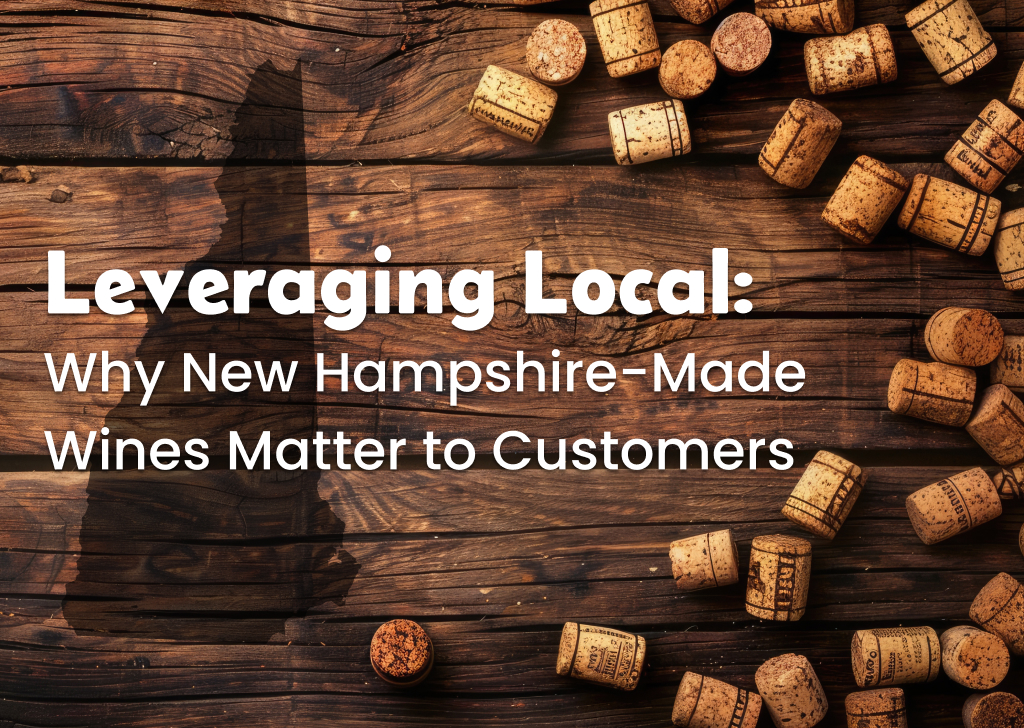Wine lovers are no longer just reaching for well-known labels from Napa, Bordeaux, or Tuscany. More than ever, consumers are seeking out local wines that reflect the region where they’re made—wines with a sense of place, sustainability, and a connection to the people who craft them.
In New Hampshire, the wine industry is carving out its own identity, proving that cold-climate winemaking can produce bottles just as compelling as those from traditional wine regions. For retailers, restaurants, and industry professionals, highlighting New Hampshire-made wines isn’t just about supporting local businesses—it’s a strategic move that taps into changing consumer preferences, sustainability trends, and the power of regional branding.
The Appeal of New Hampshire Wines: Why Customers Care
Unparalleled Adaptation to Cold-Climate Winemaking
Unlike California or France, New Hampshire’s vineyards face extreme winters and unpredictable growing seasons. Rather than working against these challenges, local winemakers have turned them into an advantage. Many are experimenting with cold-hardy grape varietals like Marquette, La Crescent, and Frontenac—hybrids developed specifically to thrive in northern climates while still producing complex, age-worthy wines. Unlike mass-market wines that often prioritize consistency, NH wines embrace the character of each vintage, resulting in small-batch wines with distinctive flavors that can’t be replicated elsewhere. This kind of authenticity is what today’s wine buyers crave.
A Stronger Connection Between Winemakers and Consumers
Buying a bottle of wine isn’t just about what’s inside—it’s about the story behind it. New Hampshire wineries are often family-run, with owners who are deeply involved in both the vineyard and production process. This hands-on approach resonates with consumers looking for wines with real people and craftsmanship behind them, not just a label from a massive international producer. Retailers and restaurants can use this to their advantage by featuring the faces and stories behind local wineries through tastings, events, and digital content. When customers feel a personal connection to a product, they’re far more likely to make it a repeat purchase.
The Appeal of Sustainability & Lower Environmental Impact
Eco-conscious shopping is no longer a niche concern—it’s mainstream. Consumers increasingly seek out brands that align with their values, including sustainability and reduced carbon footprints. New Hampshire wines tick both boxes. By supporting local vineyards, customers are reducing the environmental impact of transporting wines across the country (or across the globe). Many NH winemakers are also investing in organic farming, minimal-intervention winemaking, and sustainable land management, all of which appeal to customers who want to make responsible purchasing decisions. This makes NH wines easy to market, especially in retail environments that cater to eco-conscious shoppers.
How to Successfully Market New Hampshire Wines
Stocking local wines is one thing—getting them to move off the shelves is another. Here’s how industry leaders can create demand and excitement around New Hampshire wines:
1. Make Them Easy to Find
One mistake many retailers make is blending local wines into the general wine section, where they can easily get lost. Instead, create a dedicated “New Hampshire Wines” display that draws attention and makes the selection feel curated and intentional. Consider adding informational signage about NH wine’s unique characteristics, featuring tasting notes, food pairings, and winemaker spotlights. When customers understand what makes these wines special, they’ll be more inclined to try them.
2. Train Staff to Become NH Wine Ambassadors
A knowledgeable staff can make all the difference in sales. If employees are confident in recommending NH wines and can speak to their flavor profiles and production methods, customers are much more likely to take a bottle home. Host staff training sessions with local winemakers, provide quick reference guides on NH varietals and encourage employees to recommend local wines when assisting shoppers. A well-placed suggestion can turn a hesitant buyer into a lifelong customer.
3. Create a Tasting Experience
Customers often hesitate to buy unfamiliar wines, especially if they come from a lesser-known region. The best way to eliminate that hesitation? Let them taste it. Regular tasting events featuring NH wines help customers explore what makes these bottles special while creating a more interactive shopping experience. If in-person tastings aren’t an option, digital content—such as short videos featuring local winemakers talking about their wines—can be just as effective.
4. Leverage Local Partnerships
Strengthen the local connection by partnering with New Hampshire farms, cheesemakers, and restaurants to create cross-promotional opportunities. A New Hampshire wine and cheese tasting event? A restaurant highlighting NH wine pairings on their summer menu? These collaborations give customers more touchpoints to experience and fall in love with local wines. Retailers can also offer seasonal pairings, such as NH wines designed to complement local seafood in the summer or heartier reds for cozy winter meals. Giving customers a reason to buy a particular wine at a particular time of year increases both sales and engagement.
Local Wines, Big Potential
The growing interest in locally produced wines is more than just a passing trend—it’s a shift in the way people shop, dine, and experience wine. For retailers and industry professionals in New Hampshire, this is an opportunity to differentiate, educate, and create long-term customer loyalty by positioning NH wines as a premium choice, not just a novelty. By embracing the region’s unique winemaking approach, highlighting sustainability benefits, and creating engaging experiences around these wines, businesses can turn NH wines into a must-have for local consumers and visitors alike.
